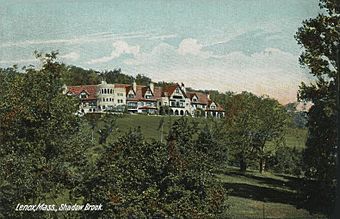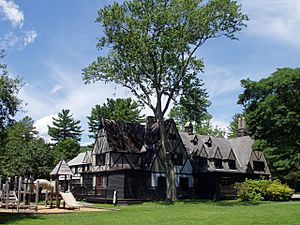Shadow Brook Farm Historic District facts for kids
Quick facts for kids |
|
|
Shadow Brook Farm Historic District
|
|

View of Shadowbrook, from a 1908 postcard
|
|
| Location | Stockbridge, Massachusetts |
|---|---|
| Area | the Berkshires |
| Architect | Wilson, H. Neill |
| Architectural style | Tudor Revival |
| NRHP reference No. | 88000202 |
| Added to NRHP | March 10, 1988 |
The Shadow Brook Farm Historic District is a special area in Stockbridge, Massachusetts. It is called a historic district because it protects important old buildings. This district includes six farm buildings that were once part of a big estate.
The main house of this estate, called 'Shadowbrook', burned down in 1956. The original mansion and farm buildings were built in 1893. They were designed by architect H. Neill Wilson. The outdoor areas were planned by Frederick Law Olmsted, a famous landscape designer.
The estate was first built for a man named Anson Phelps Stokes. Later, in 1917, Andrew Carnegie, a very rich businessman, bought Shadowbrook. He passed away there in 1919. From 1922 to 1970, the estate was used by the Jesuits. It was a place where new Jesuit priests trained.
After the fire, a new building was constructed, also called Shadowbrook. Today, the historic district is mostly home to the Berkshire Country Day School. This school bought its land from the Stokes family in 1963. The Shadow Brook Farm Historic District became part of the National Register of Historic Places in 1988.
A Look at Shadowbrook's Past
The name "Shadow Brook" came from the famous writer Nathaniel Hawthorne. He named it after a small stream that flows near where the mansion once stood.
In 1844, Samuel Gray Ward bought land on Baldhead Mountain. He built a house there called Oakwood. This house was very close to where the Shadowbrook mansion would later be built.
Anson Stokes bought Ward's property in 1892. He also bought more land, making his estate very large. It covered about 1,500 acres (607 hectares). Stokes tore down most of the Oakwood house. He then built his grand new mansion in 1893.
The new Shadowbrook mansion cost a lot of money to build. It was shaped like the letter 'L'. The house combined two main styles: English Tudor timbering and stone. From the mansion, there were amazing views of the area. You could see Stockbridge Bowl, West Stockbridge Mountain, and other beautiful hills.
Many farm buildings were also built as part of the estate. These buildings were in the valley below the mansion. Members of the Stokes family lived in these farm buildings for many years.
In 1898, Anson Stokes had a riding accident on the property. He was badly hurt and later moved away. The estate was mostly empty for a while. In 1905, it was sold to Spencer P. Shotter. He left in 1912.
In 1916, Andrew Carnegie bought the mansion for $300,000. At that time, it was one of the largest private homes in the United States. The estate was a great example of the Gilded Age in the Berkshires. This was a time when many very wealthy people built huge, fancy homes. Andrew Carnegie passed away at Shadowbrook in 1919.
Three years later, in 1922, the Society of Jesus bought the property. They used it as a novitiate. This was a special school where men trained to become Jesuit priests.
The Fire and What Happened Next
On March 9, 1956, the main Shadowbrook mansion was destroyed by a fire. Four of the 150 people living there died in the fire. Two more people later died from their injuries.
Even before the fire, plans were being made to replace the building. It was very expensive to keep up the old mansion. A new building was finished and ready to use by 1958. It was built about 400 yards (366 meters) west of the old ruins.
In 1970, the Jesuit training center moved to the Boston area. The new Shadowbrook building was empty until 1983. Then, a Hindu ashram bought it. They created the Kripalu Center there. This center is a place for yoga, health, and wellness retreats.
In 1956, a priest named Francis X. Shea wrote about the history of the Shadowbrook mansion. He also wrote about its destruction. His story was published in 2009 by the Society of Jesus.
Images for kids





